EFF recently received documents in response to one of our Freedom of Information Act (FOIA) requests that demonstrate a disturbing trend: the FBI's arbitrary application of FOIA exemptions to hide, or in some instances, reveal, its unlawful activities.
Through a careful comparison of thousands of pages of documents we received from this FOIA request with the same documents we received from an earlier FOIA request, we found that redactions in many of these duplicated documents were strikingly different. In several cases, the FBI redacted more information in later-produced documents than it did in earlier-produced documents. In other cases, the FBI redacted differing amounts of information when it produced two copies of the same report in response to the same FOIA request. Sometimes the agency blocked out whole paragraphs, while at other times it blocked out only the key words that explain the details of its acts. What is interesting is that the FBI claimed the same FOIA exemptions in each version; it just applied them differently.
The documents at issue are reports submitted by the FBI to the Intelligence Oversight Board (IOB), a body that is charged with overseeing the intelligence community's compliance with the Constitution and intelligence laws. In all, the documents total almost 2500 pages, and we'll discuss the troubling picture they paint of an agency engaged in excessive illegal intelligence gathering in a later post. But first, below, are side-by-side comparisons of four reports and an overview of the information they reveal (move the slider to see the differences). Following that is our analysis of what this means for the public’s access to information about our government.
The Documents
1. FBI IOB Report 2001-69 - NSL for Financial Records
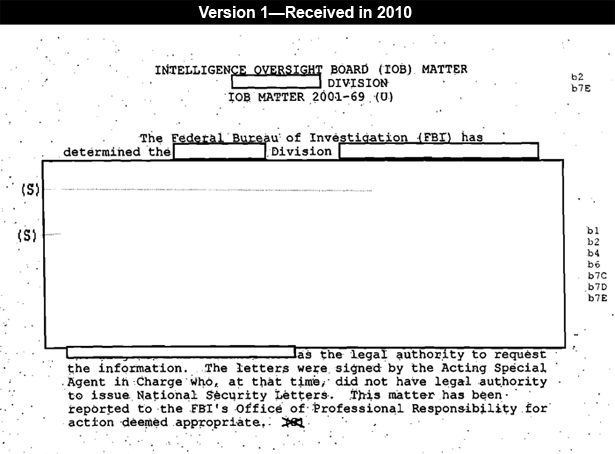
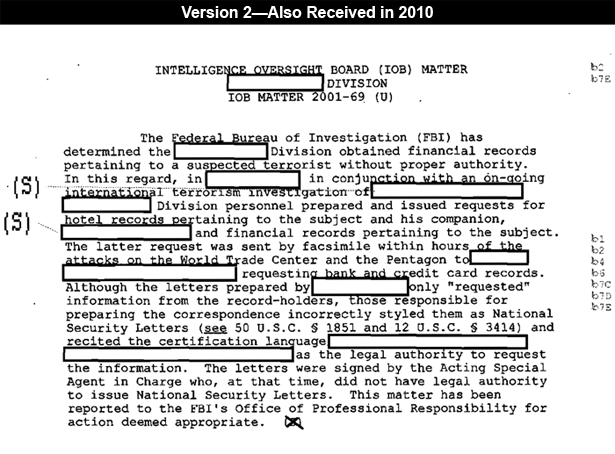
We received two copies of the same report in response to our more recent FOIA request to the FBI. The same exemptions were claimed in both copies of the report but Version 1 is much more heavily redacted than Version 2.
The report discusses the FBI’s improper collection of bank and credit card records. In Version 1, all important information about the violation (including that it relates to financial records) was withheld. Version 2 reveals most of the details and shows the extent of the FBI’s violation. In this matter, the FBI, as part of an ongoing investigation into international terrorism, sought hotel and financial records on a subject. Although the agent responsible had no legal authority to obtain the financial records, he or she purposefully styled a request to a financial institution as a National Security Letter (NSL) to hide this fact, essentially lying to obtain the bank and credit card information. There is likely no way the financial institution receiving the NSL would have been able to tell the letter was illegal and thus no one would have been able to challenge this violation of the law. And even if the bank found out the NSL was illegal, the “gag order” accompanying all NSLs at the time would have prevented the bank from talking about it publicly.
2. FBI IOB Report 2003-115 — Illegal Use of FISA-Authorized Pen Register
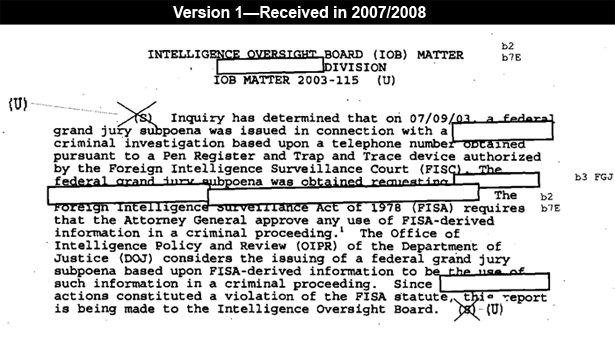
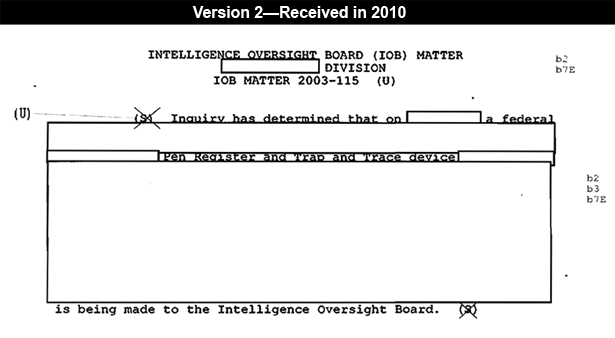
We received Version 1 of the report above in response to our FOIA request from 2007. This version details the FBI’s use of a telephone number collected under a FISA-authorized pen register/trap and trace surveillance to support a federal grand jury subpoena in a criminal investigation. This is problematic because the law clearly precludes the FBI from using a FISA-derived telephone number in a criminal case without the Attorney General’s prior approval. And, it appears from the report that the Bureau did not have the AG’s approval before proceeding with the grand jury subpoena.
The FBI sent us Version 2 of the report this fall in response to our 2008 FOIA. In Version 2, the Bureau has blocked out all important identifying details.
3. FBI IOB Report 2006-305 — NSL for “All Images Uploaded”
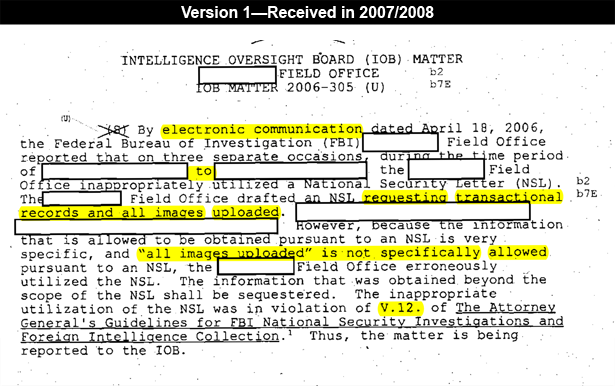
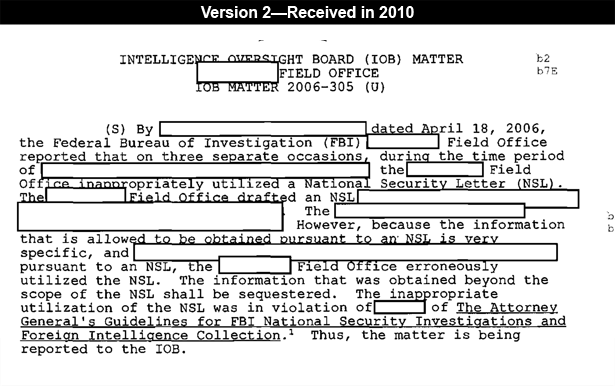
We received Version 1 of the report above in response to our FOIA request from 2007. The FBI sent us Version 2 this fall.
On first glance, the amount of information withheld in Version 2 of this report does not appear as extensive as in the two reports above. Upon closer inspection, however, the FBI has blocked out all details of its illegal activity in Version 2. This IOB report describes the agency’s attempts to use an NSL to obtain not only transactional information (a legal use of an NSL) but also all the images a subject uploaded to his ISP. As the IOB report notes, the FBI is not allowed to use an NSL to get this type of content information. (The three types of information available under an NSL are "Subscriber and Toll Billing Records," "Financial Records," and "Consumer Credit Records.") The other piece of information withheld in Version 2 of this report is the specific section of the Attorney General’s Guidelines on foreign intelligence collection that was violated. It’s unclear why the agency would have felt it necessary to block out this information, as this section of the Guidelines merely describes what information is available pursuant to an NSL (a redacted version of the Guidelines is available here).
4. FBI IOB Report 2007-717 — NSL for Educational Records
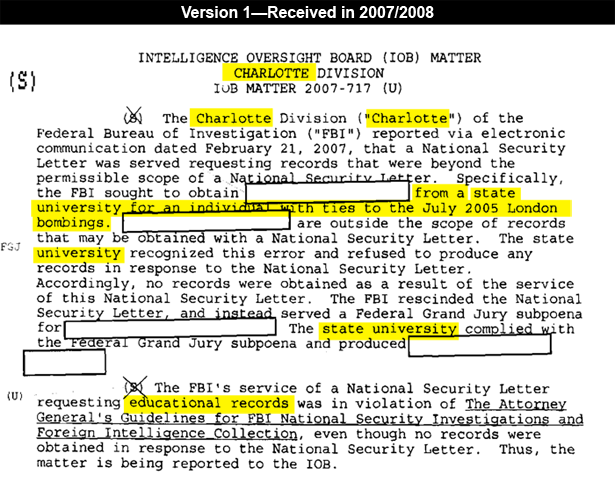
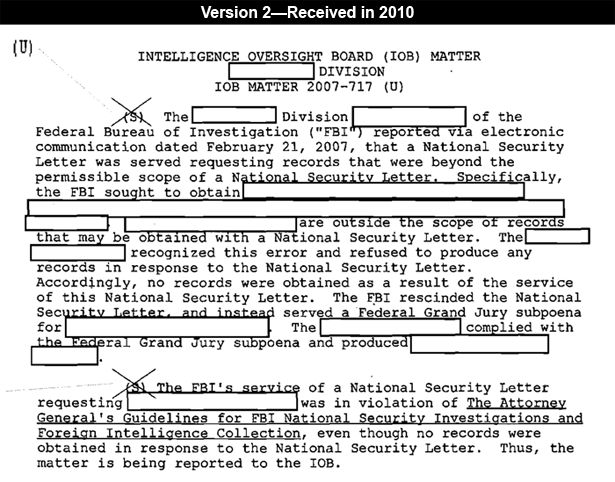
We received Version 1 of the report above in response to our FOIA request from 2007. This document (which, in its less redacted version, was the subject of an earlier EFF report) details how the FBI tried to use a National Security Letter to obtain educational records on a student at a state university in North Carolina. As we noted in our earlier report, educational records are very clearly not one of the three classes of information available under an NSL. Luckily, the university’s legal counsel recognized this and refused to comply with the NSL.
The FBI sent us Version 2 of the report this fall. Like the third report discussed above, the redactions in this version don’t appear, at first glance, to be extensive. However, when compared with Version 1, it’s clear the FBI has withheld the entire meat of the story.
Analysis
The Freedom of Information Act requires the government to disclose details of its activities to the public. Although certain exemptions within the Act allow agencies to withhold some information (for example where national security or personal privacy is at issue), the presumption is in favor of disclosure. President Obama reiterated this on his first full day of office by directing:
The Freedom of Information Act should be administered with a clear presumption: In the face of doubt, openness prevails. The Government should not keep information confidential merely because public officials might be embarrassed by disclosure, because errors and failures might be revealed, or because of speculative or abstract fears.
Many applauded the President at the time for ushering in a new era of transparency in government. However, our review of these documents finds that not only has the FBI failed to comply with this “presumption of openness,” but in fact in some cases, the amount and type of information withheld under the Obama administration is far greater than the amount of information withheld under the supposedly more “closed” Bush administration.
This certainly isn’t the first time we’ve seen evidence that an arm of the Justice Department has withheld more than it is entitled to under FOIA. We found this in the FBI’s response of one of our earlier FOIA requests and reported on it here. More recently, the New York Times reported on the Justice Department’s attempts to keep from the public eye evidence of its embarrassing role in the US government’s “collaboration with [Nazi] persecutors.”
This trend is problematic because it puts Americans at a distinct disadvantage in obtaining information necessary to be informed about how our government operates. In each of these cases, if we or the Times had not obtained a second version of the document, we likely would not have been able to discover the agency’s cover up. The FOIA exemptions claimed by the agency are difficult to challenge in court, and the agency, by virtue of the fact that it has access to all the text, clearly has the upper hand.
In the recent controversy over the latest WikiLeaks release, many have argued that WikiLeaks’ release of unredacted and in some cases classified documents has put the United States at risk. However, the documents WikiLeaks has released have also informed Americans about the actions of our government, both the good and in many cases the bad. These documents tell us what the government is up to, and also fuel an educated public debate about government activities. These are the goals of FOIA, and when the FOIA process works properly (i.e., when agencies do not withhold more information than they are entitled to under the Act and do not drag their feet on releasing records until someone challenges them either through a request or litigation), all Americans benefit. However, when federal agencies arbitrarily withhold information and don’t play by the rules, it makes it more likely that entities like WikiLeaks will feel the need to work around a broken system that seems to encourage unnecessary secrecy.
Federal agencies should not be able to hide their missteps behind white blocks. We plan to bring this to the court’s attention in our lawsuit challenging the FBI and other agencies’ improper withholding of reports submitted to the Intelligence Oversight Board.










